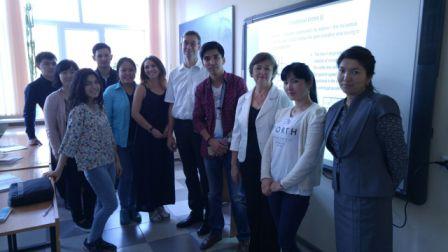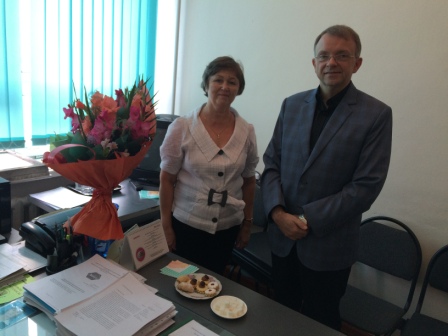ГПИИР
- Hits: 373
Judging the Quality of Programmes: “Fitness for Purpose”
Purposes and outcomes of Master’s study program (SP) meet the 7th level of the National Qualifications Framework of the Republic of Kazakhstan, they are also harmonized with the Dublin descriptors, the 2nd cycle of the Framework for Qualifications of the European Higher Education Area, as well as with the 7th level of The European Qualifcation Framework for Lifelong Education. Objectives and learning outcomes of SP "Innovative technologies of inorganic acids and salts" are described in Table 1.
Table 1 - Interconnection goals and learning outcomes (LOs) of Master‘sSP "Innovative technologies of inorganic acids and salts"
| Programme goals | LOs |
|
Goal 1. Training practice directed masters ,able to carry out production operation,technological and design operation ,introduction and implementation of new technological solutions to process the phosphate raw material and production of mineral acids ,salts and fertilizers |
LO 1. To analyze the composition of mineral and technogenic raw materials for the synthesis of inorganic acids, fertilizers and salts, to process and to summarize results. LO 2. To manage technological processes of treatment of mineral and technogenic raw materials into target products, to carry out control and regulation of the technological line operation mode as a whole and its separate components, to prevent accidents, to eliminate the damage caused by an accident reverse, to bring the technology to regulation operation mode. LO 3. To develop new and to improve acting technologies of mineral and technogenic raw material processing into mineral acids, fertilizers and salts in order to intensify processes and to create wasteless productions. LO 4. To perform an effective monitoring of observance of regulatory requirements for quality, standardization and certification of products and for production safety, consumption norms of raw material and energy resources. LO 5. To apply acquirements and skills for problem solving within multidisciplinary areas of knowledge related to chemical sciences. LO 6. To carry one's point clearly and reasonably during the discussion, to rationalize and to prove research results to specialist and non-specialist audience. LO 7. To use knowledge of solubility and phase conversions in multicomponent water-salt systems to select optimal technological mode of a production and to evaluate an applied significance of produced products. LO 8. To perform a feasibility study of innovative technologies, to identify and to assess risks of their using, to simulate basic processes and apparatuses and plant units, to develop initial data for new technology project engineering. LO 9. To find optimal solutions to modernize existing equipment operation, to select and to design new equipment, for industrial waste deactivation and recycling. LO 10. To develop professional acquirements and skills to the level which allowsto continue training on the third cycle degree program. |
| Goal 2. Training masters with leadership qualities and skills of logical analysis of the set tasks ,training masters able to work in unternational group, engage in institutional and management activity. |
LO 11. To work effectively individually and in a team, to demonstrate good communication skills and psychological qualification to the practical professional activity, to work with specialists of related industries, to make management and technical decisions. LO 12. To show leadership and initiative in solving actual industrial-technological, research, design and environmental-economic problems. LO 13. To develop independently qualification over a whole period of professional activity, to know foreign language in the professional sphere at a level allowing to work in the international environment. |
Profile master training within the State Program of Industrial-Innovative Development of RK
According to the beginning the second stage of the State Program of Industrial-Innovative Development (SPIID-2) of the Republic of Kazakhstan (RK) for 2015-2019 (approved by the RK President executive order No 874 of 01.08.2014) M. Auezov SKSU started in 2015 training highly-qualified personnel in the post-graduate education for priority industrial branches of South Kazakhstan including chemical industry.
Within the framework of the Program the department “Chemical Technology of Inorganic Substances” realizes since 2015-2016 academic year the profile master training on the specialty 6М072000 – Chemical Technology of Inorganic Substances in educational programs “Synthesis of Polycomponent Mineral Fertilizers” (2015-2016 academic year) and “Innovative technologies of inorganic acids and salts” (2016-2017 academic year).
Experienced specialists – professors and associated professors are involved in master student training. Also visiting foreign professors are invited for lecture classes teaching. They are professors of Technical University of Munich (Germany) Dr. Kai-Olaf Hinrichsen and Dr. Fritz E. Kühn, professor of Technical University of Chemnitz (Germany) Dr. Heinrich Lang, professor of D.I. Mendeleyev Russian Chemical-technological University (Moscow, Russian Federation) Dr.Sci.Tech. Petropavlovsky Igor Alexandrovich.



The structure of the educational program includes master student theoretical training, experimental-research work, practical training, complex examination and master thesis performance. Based on master thesis results and defense the academic degree “Master of technique and technology” is awarded.
The term of training in the Master Program is one and half years. At that a special attention is paid to master student practical training for the entire third semester and experimental research and project development on relevant topics of productions of mineral fertilizers, salts and acids. Educational programs “Synthesis of Polycomponent Mineral Fertilizers” and “Innovative technologies of inorganic acids and salts” passed successfully an expertise and were agreed with leading domestic enterprises of this industry: LLP “KazAzot” (Aktau city), LLP “Kainar” (Shymkent city), LLP “RPC” (Shymkent city), LLP “KazPhosphat” (Taraz city). Trilateral agreements between the university, master student and these enterprises were concluded for master student employment after graduation; master students pass practical training at them as well.
Within the framework of the Program SPIID-2 the university purchased equipment for a pilot plant of mineral fertilizers production and a complex of up-to-date analytical devices and plants for new research laboratories where master students carry out their experiments and laboratory works in the studied disciplines.
.jpg)
.jpg)
.jpg)
.jpg)
ГПИИР







